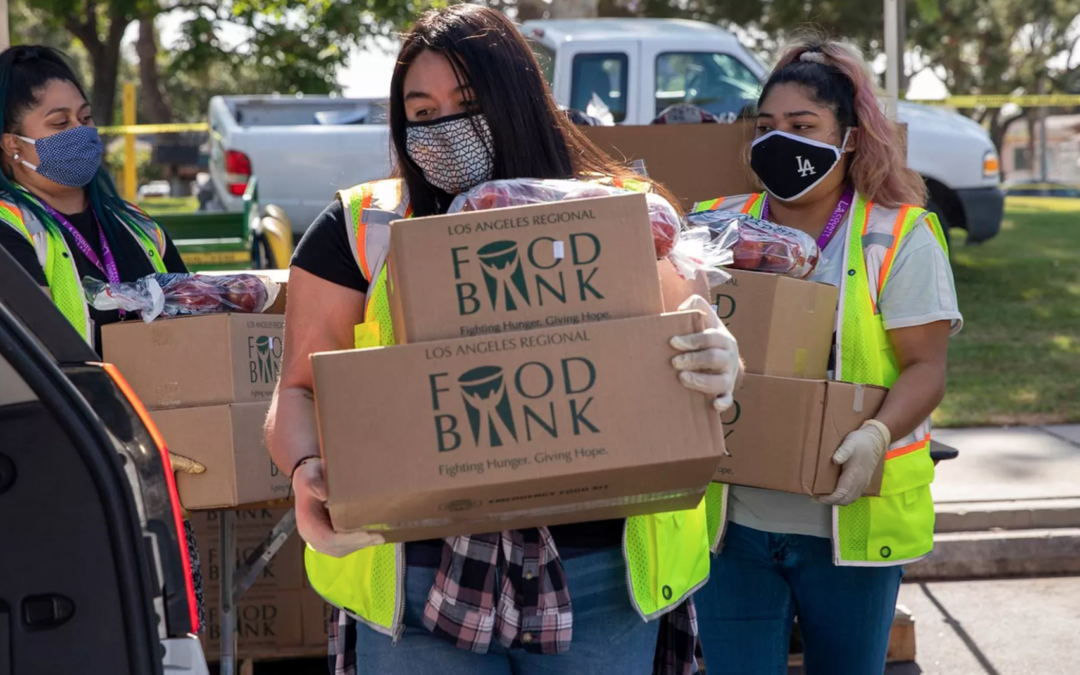
by Sydney Mathews | Nov 10, 2020 | Feature, General, News
Los Angeles, CA. The Healthy LA Coalition was established by a number of nonprofit organizations looking for solutions to the hardships caused by COVID-19 in the LA County area. (Above photo is of volunteers at Maywood YMCA for LA Regional Food Bank).
“We actually came together for the first time on the evening of March 12th,” said David Levitus, one of the original co-organizers of Healthy LA, “I ended up putting together the Healthy LA website for two hours on Saturday on the 14th, got it published, put up a Google form to collect signatures, and it just snowballed from there.”
It started with twenty-five people on a conference call discussing how they can help with pushing legislation that will help the community affected by the pandemic. After the creation of the official website, Healthy LA would quickly grow from a network of twenty-five in March to 335 by the end of the summer. While the majority of organizations that were added to the website were nonprofits, thirty-five religious congregations/denominations and twenty-eight regular businesses had also joined the coalition via application through Levitus’s Google form.
The rapid growth of the Healthy LA Coalition over the course of a few months allowed the network of organizations to develop thirty different legislative proposals to the board of supervisors for LA County.
“We just knew that the crisis was so big that even on the economic side, we needed nothing less than really bold proposals,” Levitus stated.
Twenty of the thirty proposals Healthy LA presented to the LA City Council and County Supervisors were enacted through immense lobbying efforts and communicating to the general public about the proposed legislation. The proposals covered a wide array of protection for the community including the unhoused, undocumented, and incarcerated individuals in the county.
Levitus considered their collective effort to increase worker protection was one of the most significant victories for Healthy LA as it guaranteed fourteen days of sick leave for an additional 440,000 LA workers. These city and county workers were not originally eligible for the federal paid sick leave policy as they worked in firms with over five hundred employees.
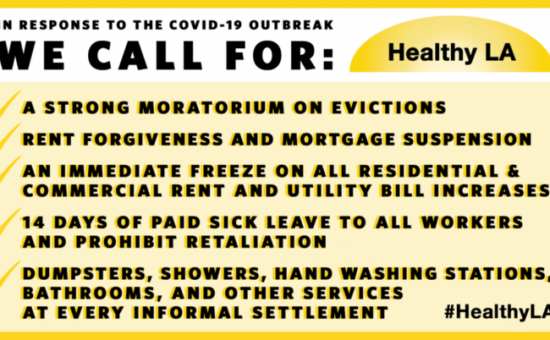
The initial website banner for Healthy LA and its main proposals which have nearly all been passed by the LA City Council and Board of Supervisors.
One of the proposals that have proved to be more challenging to pass on both a county and state level is a robust moratorium for foreclosures and evictions. There are currently protections for tenants who are unable to pay for their rent that has recently been extended to March 2021; however, if tenants are unable to pay the minimum 25% of their regular rent in the coming months, they can be evicted as early as February 1. Considering that the moratorium could have been extended as far as 2024, Healthy LA continues to advocate for tenants who face eviction in the next year.
Levitus stated that the long-term goal for Healthy LA is a “just recovery” as there are often marginalized groups of people who are left out of recovery as seen in the 2008 Great Recession. He hopes to continue giving workers a voice; as well as, tenants because a recent UCLA study showed roughly 20% of city residents have struggled to pay rent on time.
Levitus believes there is still a lot of work to be done to help those who need it most and that drastic social reform as seen after the Civil War and the Civil Rights Movement would make a positive difference to Los Angeles and beyond.
“We need a third reconstruction,” Levitus said in consideration to the coalition’s goals beyond COVID-19, “to transform our society that is racially and economically just, and I think we all share that perspective at Healthy LA so that’s really the long-term vision.”
From Healthy LA Coalition:
We are a network of more than 330 advocacy organizations, worker centers, labor unions, service providers, religious congregations, community groups, affordable housing developers, public interest lawyers, public health and safety organizations, and many more uniting to propose concrete solutions to the many hardships caused by the COVID-19 pandemic.
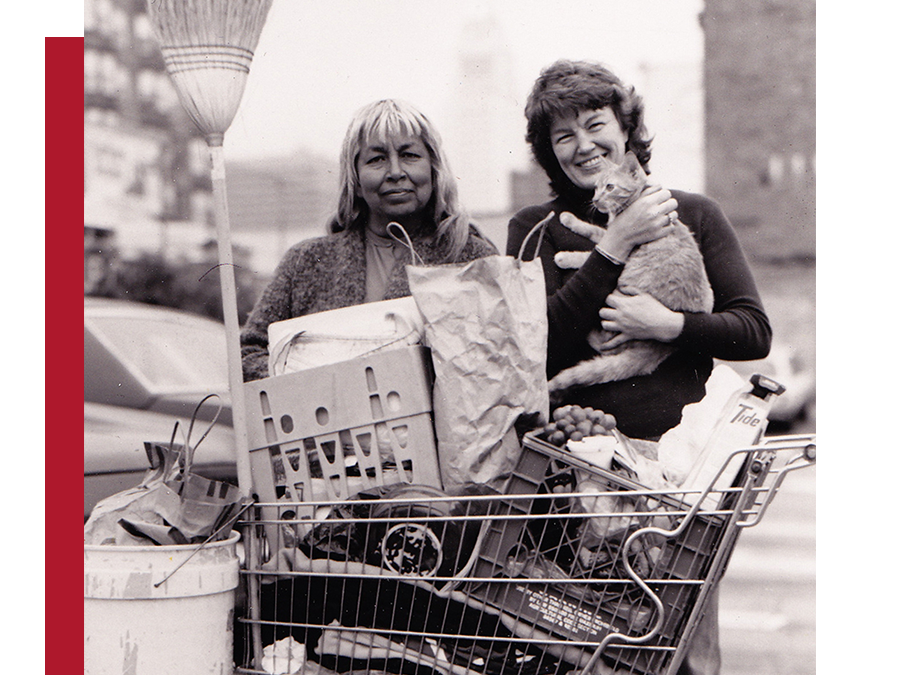
by Yasmin Vieira | Oct 30, 2020 | Feature, General, News |
Los Angeles, CA. Over the last forty years, The Downtown Women’s Center (DWC) has helped nearly 110,000 disadvantaged women with meals and housing. DWC was launched in 1978 because of the friendship between two women; Jill Halverson (pictured on the right above) created the nonprofit to help an inspiring homeless woman, and friend named Rosa (pictured above on the left). During the four decades that followed, DWC has grown into a nonprofit providing many vital services to disadvantaged women. DWC is the only organization in Los Angeles focused exclusively on serving and empowering women experiencing homelessness and formerly homeless women.
DWC representative Anita Vukovic says it’s hard to keep up with all the need, especially during a pandemic. “A lot of DWC work had to change due to consideration of social distancing measures, our community is especially vulnerable to COVID-19 due to underlying health conditions that many women experience. Our community is usually 55 years old and older,” Vukovic explained. DWC is able to provide more than 800 meals a day and offer on-site services in its parking lot, which enables social distancing. “Our health clinic also continues to operate Tuesday to Friday.”

Today, DWC manages 119 units of permanent housing across greater Los Angeles (like the apartment seen above) and has grown to serve more than 5,400 women annually.
DWC was recently selected as one of the 2020 California Nonprofit of the Year by California Senator Holly Mitchell of the 30th Senate District. DWC is one of over a hundred other nonprofits that will be honored by their state senators and assembly members for their contributions. State leaders want to honor DWC staff and volunteers, because they provide women with access to basic needs and resources, housing assistance, trauma-informed case management, mental and physical healthcare, job readiness and workforce development, and advocacy training and resources. “As our services expand to meet the community’s growing needs under COVID-19, we are deeply humbled to be recognized as a 2020 Nonprofit of the Year,” said DWC Chief Executive Officer Amy Turk. “DWC’s decades-long relationship with Senator Mitchell has always been a special one, and we are thrilled to continue working with her to bring greater visibility and resources to women experiencing homelessness in Los Angeles and across California.”
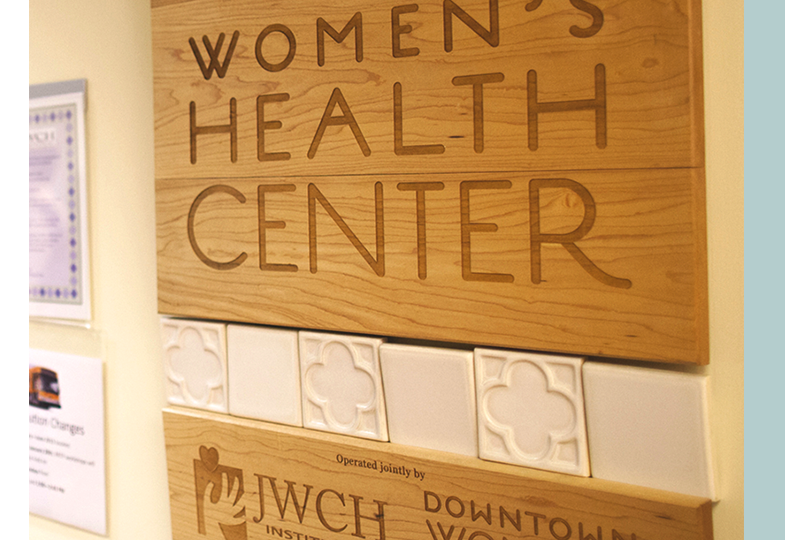
Women’s Health Center Clinic, DWC.

The Covid-19 pandemic has also made it difficult for DWC to use outside helpers.
“Volunteers have been the heart of our community in everything we do and how we are able to serve women,” says, Vukovic. DWC is still looking for opportunities to get their volunteers together. In September DWC had a three-week virtual campaign. “We saw a lot of positive feedback and engagement with that, people were really excited to be able to engage. We are looking into actually continue with that into the future.”
From Women’s Health Center:
How can you be informed on Housing First and Trauma-Informed:
- Access to basic needs and resources through our Day Center, where women can receive three daily meals and access to showers, restrooms, mail, laundry, and telephones.
- On-site housing and supportive services, with our 119 units of permanent housing across two residences making us one of the largest housing providers for women in the country.
- Community-based housing services, provided in partnership with the Los Angeles County Department of Health Services, the Los Angeles Homeless Services Authority (LAHSA), the Governor’s Office of Emergency Services, and various private foundations and corporations.
- Health and wellness services, including individual and group counseling, medical care, mental health services, preventive screenings, Trauma Recovery Center services, and enrichment activities.
- Job readiness and employment training, as well as job placement services and transitional jobs at MADE by DWC, in partnership with LA:RISE.
- Advocacy training, to empower women to become successful advocates for themselves and others by participating in press interviews, public policy meetings, lobby visits with legislators, fundraising events, press conferences, and more.
- Public education and volunteering, with a volunteer program that engages over 5,000 individuals annually.
- Research and evaluation, to continue to push the envelope on creative solutions to ending homelessness by providing real-time data on needs and impacts (see the DWC 2019 Los Angeles City Women’s Needs Assessment here).
We envision a Los Angeles with every woman housed and on a path to personal stability. Our mission is to end homelessness for women in greater Los Angeles through housing, wellness, and advocacy.
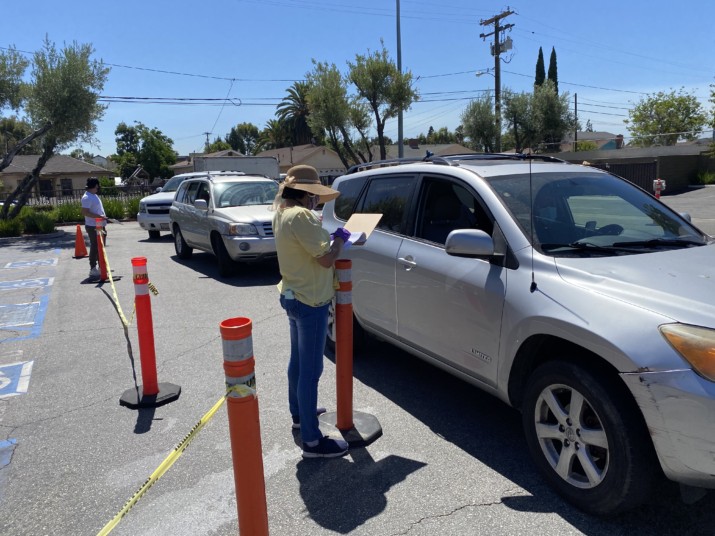
by Sydney Mathews | Oct 3, 2020 | Feature, General, News
Los Angeles, CA. During the beginning months of the pandemic, Inclusive Action for the City has helped to provide immediate cash relief for small businesses and street vendors who were not eligible for government financial support. One hundred and twenty street vendors impacted by COVID-19 received $400 cash cards in early June through the Street Vendor Emergency Fund (see above).
For several decades, tens of thousands of street vendors have served the residents and tourists of Los Angeles despite the fact it was a criminalized practice in the city. It wasn’t until 2008 when they came together to legalize street vending with the help of the organizations that specialized in community development like East LA Community Corporation (ELACC).
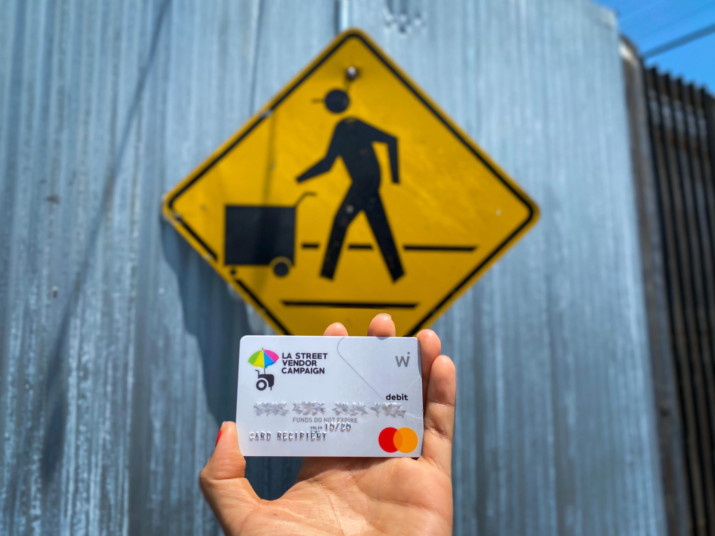
Cash Cards for Street Vendors were much appreciated.
As street vendors started working with nonprofits, the Legalize Street Vending Campaign: Leadership for Urban Renewal Network (LURN) was created and focused on advocating for low-income communities, primarily concentrated with small businesses.
It wasn’t until a decade later that the long-term efforts of LURN and other committed communities paid off. Street vending became legal in November 2018, and low-income entrepreneurs were able to take control of their businesses and take care of their families without risking their livelihood.
LURN would eventually be renamed to Inclusive Action for the City and two years later, as COVID-19 became a predominant concern, there was a need for immediate relief for small, informal businesses.
“Inclusive Action is a lender, we provide small business loans to entrepreneurs,” said Inclusive Action’s executive director Rudy Espinoza, “many of our clients are street vendors, and they were coming in already anticipating that they were not going to be able to make their payments.”
Street vendors are not generally eligible for small business relief funds or other forms of government-sponsored financial support. Espinoza and his team were aware of this and heavily discussed in mid-March whether or not they should provide loans to those who were struggling with the quarantine. However, Inclusive Action decided against this action.
“We should not be doing loans to people right now that are struggling, but we need to get people cash,” Espinoza declared.
It was decided that the best way to help street vendors immediately was to distribute $400 cash cards (seen above) that could be withdrawn and used however the individual chooses. The decision allowed for the creation of the Street Vendor Emergency Fund with the collaboration of ELACC and Public Counsel.
1,032 street vendors were given immediate relief with the fund over the summer but Espinoza believes its “a drop in the bucket” to the much larger systemic issue of street vendors not being eligible for government benefits and having to rely on nonprofit organizations for relief during the pandemic.
“There should be more systems to protect vendors and take care of them during pandemics,” Espinoza said, “and the fact of the matter is that many of them have been struggling for a long time.”
There is hope for vendors to receive more immediate relief and support by the city as the Sidewalk Vending Pilot Program was recently passed by the LA County Board of Supervisors which will invest $1 million in assisting vendors with health-compliant equipment, education outreach, and other needs that will allow street vendors to safely sell in unincorporated areas of Los Angeles.
If you have the means to donate to Inclusive City for the City to continue working to help street vendors, click here.
From Inclusive Action for the City:
Inclusive Action addresses the root causes of poverty by merging good urban policy with sound economic development initiatives that reduce barriers, increase opportunity, strengthen local economies, and empower low-income residents and entrepreneurs across Los Angeles.
Our programs and initiatives seek to uplift those who face the most obstacles to social and economic opportunity. Inclusive Action empowers communities by prototyping innovative, scalable solutions that seek systems change, generating models that can be replicated and applied to all types of urban environments.
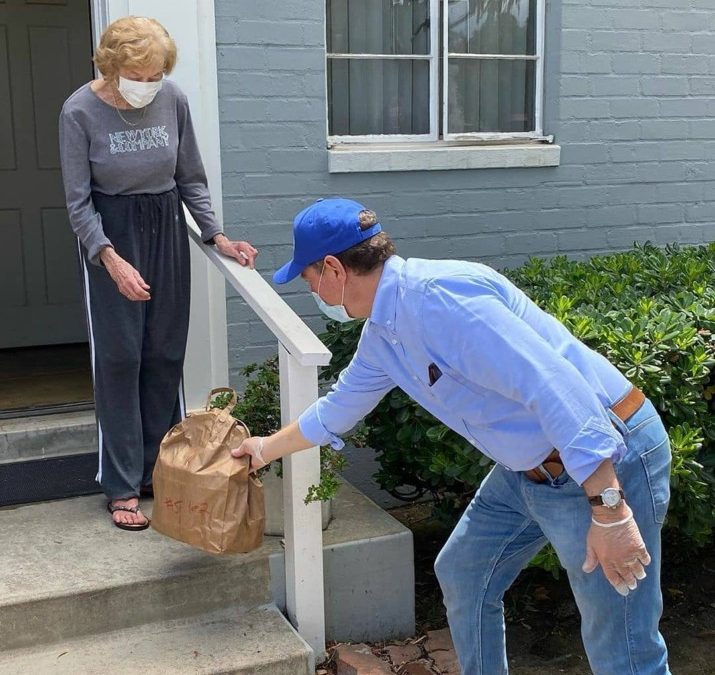
by Abdo AlRayyis | Jul 29, 2020 | Feature, General, News
Los Angeles, CA. Facing a global pandemic, Project Angel Food needed to rise to the occasion. Richard Ayoub, the executive director of Project Angel Food explains the COVID-19 “forced rapid growth. We had no time to do it, we just had to do it.” The nonprofit was created in 1989 amidst the HIV pandemic as a small kitchen to deliver meals and fight malnutrition in the HIV/AIDS community. Today, the project boasts an 8000 square feet organization serving many other life-threatening illnesses. It was ready to help alleviate suffering from COVID-19.
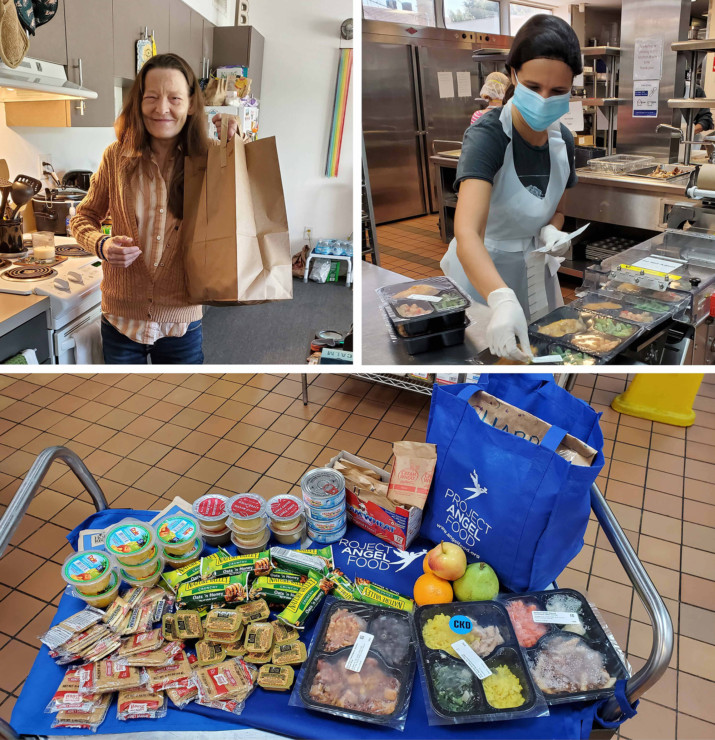
Staffers say Project Angel Food targets some of the most vulnerable and isolated communities where 62% of its clients are over the age of sixty and 50% are living alone.
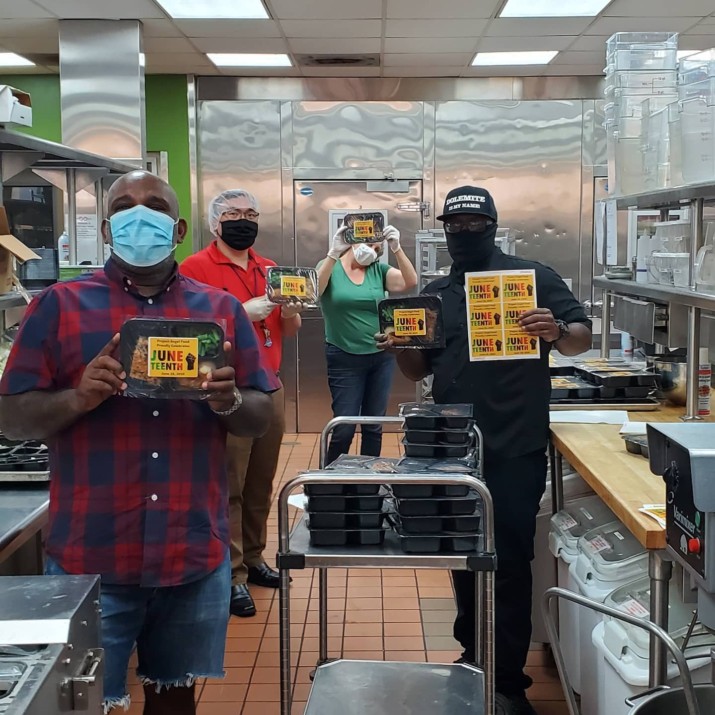
In the kitchen, staffers introduced plexiglass, contact-free deliveries, and over 13,000 facemasks to volunteers and clients. “If you build the project, the money will come and clients will come. Within five months, we had 7000 donations! Twice as many as last year because people care about other human beings.” Ayoub added.
Richard Ayoub stepped away from the entertainment business to lead this project. As he put it, “I received the call. And I answered it.” He believes that his organization was born for this pandemic, as it was created “in response to the AIDS crisis when we started sending love in the form of food. Now we’re in the middle of another pandemic so we’re continuing our mission,” Ayoub said. “Everyone is trying to get back into the office, and I never left my office” he added.

Richard Ayoub, executive director of Project Angel Food.
Every year, Project Angel Food turns its parking lot to a gala fundraiser called Angel Awards. This fundraiser has hosted a number of celebrities such as Elizabeth Taylor and Adam Lambert. Last year, the nonprofit raised a record $900,000, far exceeding its target goal of $700,000. Due to the COVID-19 pandemic, administrators resorted to a telethon on television. When comparing online donations to the telethon Ayoub explained, “If you talk to a human and make the call, you have a story and a connection and you get to tell that story and get that fulfillment in your heart. We forget that the donors have their own stories.” The livestream of the show can be found on KTLA’s Facebook page and Project Angel Food’s website…and it’s still possible to donate by texting LOVE20 to 50155.
As social distancing guidelines strengthen, Project Angel Food started noticing “their clients feeling more isolated and in need of an extra human touch” Ayoub said. Especially “our clients with COVID-19 are the ones who feel ostracized and it reminds us of the people who have AIDS”, he added. In response, Project Angel Food started a new program called Telephone Angeles where volunteers call the clients to check on their medical and mental health. Keeping volunteers and clients both engaged in the process. Ayoub himself is part of the program, “I was on the phone for about 45 minutes with one client,” he said. “He told me about his problems walking and his wife’s Parkinson’s disease, his wife is also a client”.

Food tray by Project Angel Food.
With all fundraisers canceled for the year, donations were critical for the 30-year organization to continue serving healthy meals to 2,100+ people a day with critical illnesses who are even more vulnerable because of COVID-19. The clients pay nothing for these medically-tailored meals and Project Angel Food is on track to deliver 1.4 million meals in 2020.
From Project Angel Food:
Project Angel Food is the loving neighbor who knows that food is medicine, food is love, and food nourishes the soul. We believe no one fighting critical illness should go hungry, which is why we personally deliver, with care and compassion, free medically-tailored meals, handmade with healthy ingredients to those in our community who are hungry and alone.

















